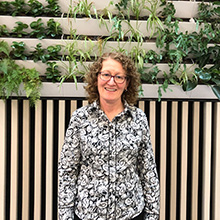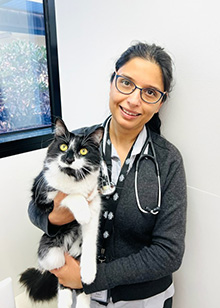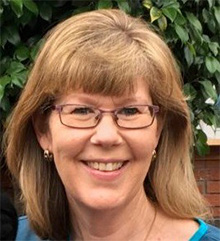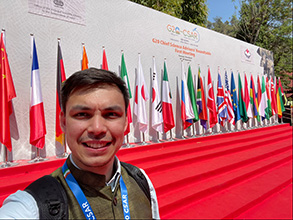The Department of Agriculture, Fisheries and Forestry is Australia’s largest public sector employer of veterinarians.
If you are interested in an exciting, challenging and rewarding career, we encourage you to consider the opportunities that the department can offer.
The work of the Office of the Chief Veterinary Officer and the department is critical to Australia’s biosecurity system by protecting the health of our animals, people and environment from the problems of animal pests and diseases.
This work includes:
- developing national policies and strategies, and providing scientific advice that minimises the potential impacts of diseases on Australia’s animal population
- supporting and enhancing trade and market access for animals and animal products
- liaising with public health, environmental and veterinary experts and agencies to advocate cooperation between animal, human and environmental health fields.
This important work occurs around Australia in offices, airports, mail centres, shipping ports, laboratories and abattoirs, and in various locations overseas.
The department recognises the importance of work/life balance and provides an excellent workplace environment.
You can visit the jobs section on our website where all of our employment opportunities are listed when they become available. The department's Graduate Development Program offers another entry point into the department with a year-long program including training and development.
For the latest updates on the work of the Office of the Chief Veterinary Officer, please follow our Twitter channel @ChiefVetAus.
You can also read more about the diversity of our work through the veterinarian profiles below.
Publication details
Department of Agriculture, Fisheries and Forestry
Download
Consider a career as an Australian Government Veterinarian (PDF 356 KB)
If you have difficulty accessing these files, visit web accessibility for assistance.
Veterinarian Profiles
See the diversity of our work through the experiences of our veterinarians
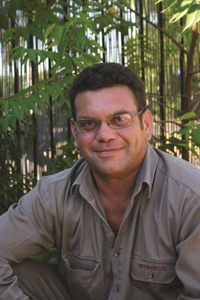
Joe, Veterinary Officer
Northern Australia Quarantine Strategy (NAQS)
Keeping a Top Watch in Australia’s north
‘As a veterinary officer for the Northern Australia Quarantine Strategy, I survey domestic and wild animal populations in remote areas of the Northern Territory coast for exotic pests and diseases. I work closely with Indigenous ranger groups, pastoralists, park rangers and the public to educate them about these threats.’
‘My career highlights include securing an understanding with Bradshaw and Yampi Sound military training bases which allows us to survey their land for exotic pests and disease. I’ve made lifelong friends in Papua New Guinea, and have been involved in the set-up of the first Indigenous-run sentinel cattle herd in the Northern Territory, and have trained other Indigenous rangers.’
‘Though we work behind the scenes, our work is very important, especially with trade and maintaining Australia’s freedom of disease status. I’m privileged to be part of the program—the responsibilities that come with it are huge when you really think about it.’

Murli, Principal Veterinary Officer
Implementing a better system for horse imports
‘My biggest career achievement has been managing the team which implemented the government’s response to the Equine Influenza Inquiry. This involved changes to virtually every aspect of horse importation to Australia, including implementing new import conditions, inspecting overseas pre-export quarantine facilities and upgrading our own quarantine stations.’
‘Pay and working conditions made moving to the department very attractive. When I wanted to do some volunteer vet work overseas, the department held a position for me and gave me several months leave without pay. The department has trained me in management, leadership, exotic diseases, emergency disease response, food safety, auditing and more.’
‘It can feel especially hard in private practice to change your career path. Being trained as a vet gives you many skills and once you start looking you’ll probably find you’re suited to all sorts of areas.’

Sue, On-plant Veterinary Officer
Export Meat Abattoir
Protecting food safety and export markets
‘I work as an on-plant vet at an export abattoir. The role involves performing ante-mortem inspection of animals, verifying post-mortem inspection procedures, overseeing animal welfare and checking that all company activities comply with the relevant legislation.’
‘On-plant vets enable certification of Australian meat and meat products for overseas markets. Although the work environment at an export abattoir can be challenging, I enjoy it because it’s a busy and stimulating workplace.’
‘Always keep the department in mind as a career possibility. I live on a 20 acre hobby farm and have chickens, ducks, sheep, two vizsla dogs and a cat. Pay rates, regular hours, and a variety of career opportunities in country locations make it worthwhile.’
Sally, Principal Veterinary Officer
Making sure Australia is prepared for emergency animal diseases
‘I contribute to ensuring Australia will be able to respond effectively to any emergency animal disease incursion. I work closely with states and territory governments, and industry - to support development of good biosecurity practices and preparedness plans. There’s always something new and challenging to work on and the flexibility and opportunities within the department all make it a great place to work.
Examples of my work include involvement in an African swine fever outbreak simulation exercise in the USA, joining a task force to determine Australia’s preparedness to respond to a very large animal disease outbreak, and responding to urgent requests from ministers for information on how we are protecting Australia from diseases such as foot-and-mouth disease and lumpy skin disease.
With increasing global trade and travel comes increased disease risks, making the work of veterinarians in the department vitally important. Our work protects Australia’s agriculture industries and many other industries that rely on disease free animals and continued trade. This is important and rewarding work.’
Sandeep, Veterinary Officer, Post Entry Quarantine (PEQ)
Welcoming dogs, cats and more
‘I feel my role is a big responsibility in assisting to keep Australia safe from exotic, pests and animal diseases. There are thousands of dogs, cats, horses, poultry eggs, day old chicks, turkeys, pigeons, and small number of alpacas and small ruminants imported into Australia every year. I get to see a large variety of animal breeds and types of animals including military working dogs, show dogs, emotional assistance dogs and highly valuable racing horses.
The two main aspects of my job are compliance and animal welfare. It requires me to split my time between applying my veterinary knowledge both at desk and at the PEQ facility’s stables, kennels and cattery. I ensure all the imported animals in quarantine are compliant with their import conditions. I liaise with numerous stakeholders, such as importers, exporters, testing laboratories, overseas competent authorities and many more to ensure non-compliances are resolved onshore.
At PEQ’s stables I oversee routine testing on imported horses, and I inspect, collect samples from, and treat, the many dogs and cats who come through the quarantine facility. Animals are inspected throughout their quarantine period, to ensure they are free from signs of any exotic diseases before they are released into Australia. I also support other vets and biosecurity officers at PEQ and shares insights with the policy team to improve import policies and processes. Doing a job that is of value is very satisfying, and the most rewarding part of my role is reuniting animals with their families after a long process that gives me a kind of satisfaction which is hard to explain.’
Jenny, Director - Offshore Program for Animal Health
Working with Australia’s near neighbours to protect animal health and food security
‘I work with veterinarians and animal health professionals in neighbouring countries including Papua New Guinea (PNG) and Timor-Leste helping to improve animal health and production. Livestock have a special significance which goes beyond their commercial economic value in these countries - pigs and cattle are important in cultural exchange and often represent a family savings account for village smallholders. Reducing exotic animal disease entry and spread, and strengthening disease response capabilities is a win-win as it helps our neighbours and also reduces biosecurity risk to northern Australia.
I consider myself lucky to have a job which combines my love of travel and meeting new people with problem solving. It is never boring and there are always new challenges to work on along with other development partners like the Department of Foreign Affairs and Trade. For example, our team recently delivered a foot-and-mouth disease simulation exercise in PNG to help build their preparedness – it was a great experience and generated a lot of enthusiasm for ongoing work from both the Australian and PNG teams.’
There is a great variety of jobs for vets here, which I never realised until I joined the department, and it also provides a good work-life balance with flexible hours and locations, which is important when raising a family.’
Richard, First Secretary (Agriculture) – South Asia
Progressing Australia’s agriculture market access priorities in South Asia
‘I work as one of the members of the department’s Counsellor Network, as a First Secretary for Agriculture for the South Asia region (India, Bangladesh, Pakistan, Nepal, Sri Lanka, Bhutan and Maldives). It involves a three-year posting to the Australian High Commission in New Delhi, where I progress technical market access priorities for our agriculture sector, implement outcomes from our free trade agreement with India and build co-operative relationships with influential government officials and private sector partners.
I have been very fortunate to have a diverse career in the department, where I have worked as an adviser to Dr Mark Schipp during his WOAH Presidency, facilitated imports and exports of animals and their products, and led the development of Australia’s first national action plan for animal health, Animalplan.
You never know where a veterinary career in the department will take you. My training has equipped me with many transferable skills, such as leadership, complex problem solving, and international trade relations, which has supported my contribution to the strategic direction of the department since starting as a Graduate in 2015.’

